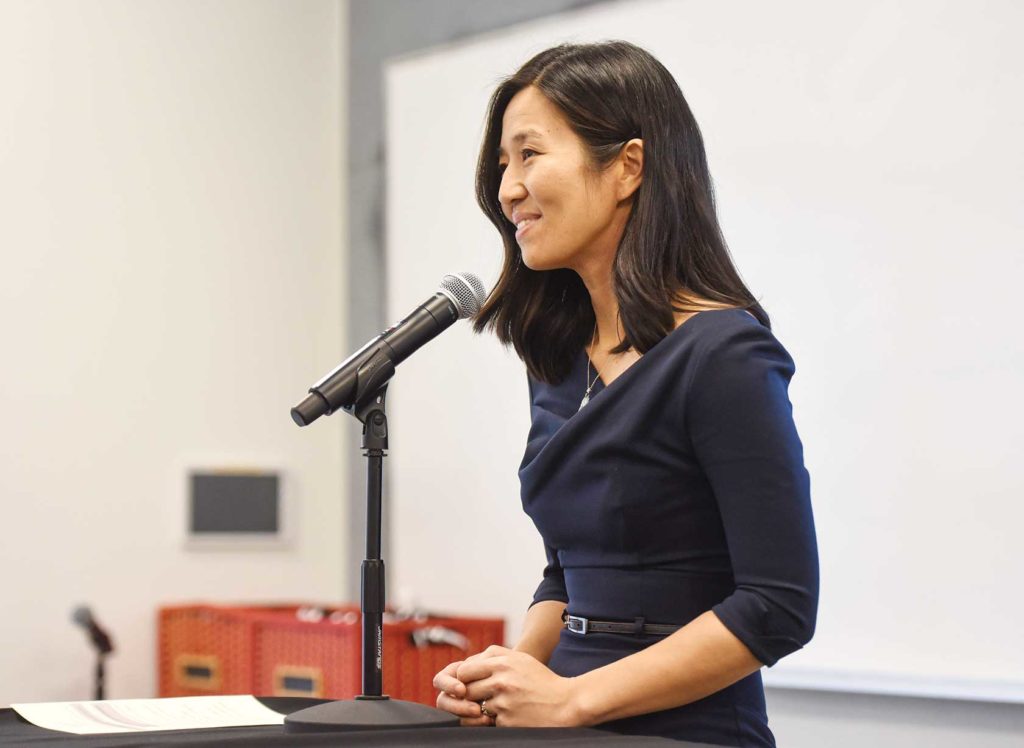Wu sends rent control plan to Council
Activists wary of 10% cap on increases

Efforts to reimplement rent control in Boston took an official step forward Monday when Mayor Michelle Wu sent her proposed home rule petition to the Boston City Council.
Details about the proposal first emerged in January, though no official text had then been released. During her bid for mayor, Wu made rent control a prominent part of her platform.
In the home rule petition, Wu proposed tying allowable rent increases to inflation, as measured by the Boston metro area consumer price index. Under the proposal, rents could increase by 6% plus inflation. Increases in rents would be capped at 10% in any given year.
Wu’s proposal would exempt some properties from the rent regulations, including new properties for the first 15 years after their construction and owner-occupied properties with six or fewer units. The details floated in January had exempted owner-occupied properties of only three units or fewer.
In addition to capping rent increases, Wu’s home rule petition would institute just-cause eviction protections, under which landlords would be unable to evict tenants unless they can show certain conditions like the tenant not paying rent, violating obligations in the lease or using the unit for illegal purposes.
For Lydia Lowe, executive director at Chinatown Community Land Trust, the proposal is a step in the right direction, but may not go far enough.
“I think that it’s positive that she’s followed up on her campaign promise, but I think that 10% is a really high increase. You know, nobody’s salary is going up 10% per year,” Lowe said. “I think what we need is a number that really can help people stabilize.”
Instead, Lowe pointed to a pair of bills at the State House that would lift the ban on local rent control measures statewide. In addition to lifting the prohibition on local measures, those bills would give municipalities across Massachusetts the option to adopt a policy that would, like Wu’s proposal, tie rent increases to inflation. Unlike Wu’s home rule petition, however, those bills would cap increases at 5% per year.
Lowe said components like just-cause eviction protections are an important piece of Wu’s proposal.
“I think just-cause eviction is really important to include, and that’s one of the positive things about putting forward a proposal, even with the higher cap, is to have at least some protections for tenants,” Lowe said.
The proposal allows for vacancy decontrol — meaning between outgoing and incoming tenants, landlords may raise rents as much as they want.
Lowe said there should be some ability for landlords to increase rents between tenants, but it should not be completely decontrolled. Karen Chen, executive director at the Chinese Progressive Association, said she views vacancy decontrol as another form of rent gouging.
The proposal faces opposition from the real estate industry. In a statement emailed to the banner, Greg Vasil, CEO of the Greater Boston Real Estate Board, suggested rent control measures might increase housing costs, discourage upkeep and maintenance, and disincentivize construction.
“We strongly oppose Mayor Wu’s plan to bring government price controls on housing to Boston because it would make the region’s housing crisis even worse. Instead, the city — and all of Massachusetts — should focus on passing pro-housing policies that reduce red tape, encourage construction, and lower overall costs,” Vasil wrote in the statement.
The home rule petition, if successful, would mark the first time rent control is allowed in Boston since it was prohibited statewide in a 1994 referendum. Prior to the statewide referendum, only three municipalities — Boston, Brookline and Cambridge — had rent control systems in place. In the wake of the referendum, a number of proposals to reinstitute rent control in Boston have been broached but ultimately have failed to bring rent stabilization back.
To be implemented, the proposal outlined in Wu’s home rule petition must be approved by the City Council and then the Massachusetts State Senate and House of Representatives and Governor Maura Healey.






